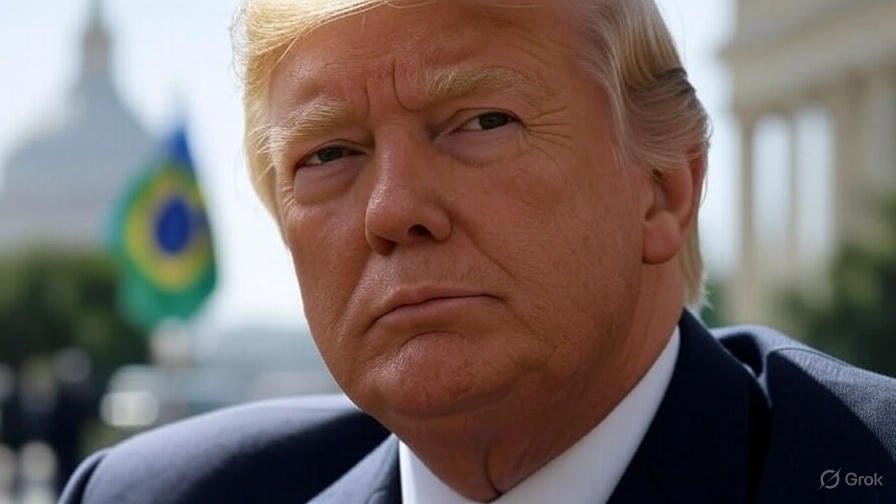Donald Trump Brazil Tariffs: In July 2025, U.S. President Donald Trump announced a whopping 50% tariff on Brazilian imports, effective August 1, sparking global headlines and tension with Brazil. This move, tied to political and economic motives, has raised eyebrows and questions about its impact. As someone who’s been following this, I’m diving into what’s going on, why it’s happening, and what it means for both countries. Let’s break it down.
Table of Contents
Why the Tariffs? A Political Power Play
Trump’s decision isn’t just about trade—it’s deeply personal and political. The tariffs are partly a response to Brazil’s ongoing trial of former President Jair Bolsonaro, a close ally of Trump. Bolsonaro faces charges for allegedly plotting a coup after losing the 2022 election to current President Luiz Inácio Lula da Silva. Trump called the trial a “witch hunt” and demanded it stop, tying the tariffs to this issue.
- Political leverage: Trump’s using tariffs to pressure Brazil into dropping charges against Bolsonaro.
- Personal ties: The two leaders share a history, with Bolsonaro often called the “Trump of the tropics.”
- Trade as a weapon: Unlike typical trade disputes, this move mixes politics with economics.
This approach has stirred controversy, with critics arguing it’s an overreach into Brazil’s sovereignty.
Economic Justifications: Fact or Fiction?
Trump also claimed the tariffs address an “unfair trade relationship” and a supposed U.S. trade deficit with Brazil. But here’s the kicker: the U.S. actually had a $7.4 billion trade surplus with Brazil in 2024. This inaccuracy has fueled skepticism about the tariffs’ economic basis.
- Key exports hit: Brazilian goods like coffee and beef face the 50% tariff, but aircraft, oil, and orange juice are exempt.
- Potential losses: Brazil’s beef industry alone could lose $1 billion in the second half of 2025.
- U.S. consumers: Higher tariffs could mean pricier coffee and other imports for Americans.
The exemptions soften the blow, but the tariffs still threaten Brazil’s economy while raising questions about Trump’s trade math.
Brazil’s Response: Standing Firm
President Lula didn’t back down. He called Brazil a “sovereign nation” and vowed to retaliate with reciprocal tariffs on U.S. goods. Lula’s defiance has rallied domestic support, with his approval ratings climbing to 43-50% after the announcement.
- Reciprocity law: Brazil’s new law allows proportional countermeasures against unilateral tariffs.
- Political boost: The tariff spat has painted Lula as a defender of national pride.
- Economic risk: A trade war with the U.S., Brazil’s second-largest trading partner, could spike inflation.
Lula’s firm stance has turned this into a high-stakes showdown, with both leaders digging in.

Global Ripple Effects: Beyond Brazil
The tariffs aren’t just a U.S.-Brazil issue—they’re part of Trump’s broader trade strategy. He’s targeted other countries like Japan and Sri Lanka with tariffs, and even threatened BRICS nations (including Brazil) with a 10% levy for “anti-American” policies. This could push Brazil closer to China, its top trading partner.
- BRICS tensions: Trump’s frustration with the group’s push for de-dollarization is a factor.
- China’s gain: Experts predict Brazil may deepen ties with China to offset U.S. tariffs.
- Global trade: Trump’s aggressive tariffs risk inflating prices worldwide.
This move could reshape global alliances and trade flows, with Brazil caught in the middle.
What’s Next? A Trade War or Negotiation?
As the August 1 deadline hit, Trump delayed the tariffs by seven days, signaling room for talks. Brazil’s pushing for exemptions and dialogue, but both sides are posturing tough. Will this escalate into a full-blown trade war, or can cooler heads prevail?
- Negotiation hopes: Brazil’s exemptions for key exports suggest a deal is possible.
- Bolsonaro’s trial: The tariffs’ political aim complicates any resolution.
- Economic stakes: Both nations face higher costs and inflation if tensions persist.
For now, the world’s watching as these two heavyweights spar. As a news junkie, I’m curious to see if trade or politics wins out. What do you think—will this blow over or blow up?